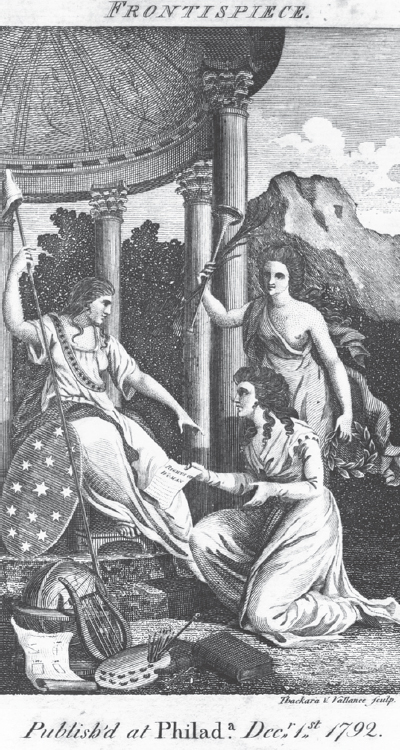Beyond America’s Borders: France, Britain, and Woman’s Rights in the 1790s
Printed Page 234 Chapter Chronology
Beyond America’s Borders
France, Britain, and Woman's Rights in the 1790s
During the 1770s and 1780s, no one in America wondered publicly about rights for women. Boycotts by the Daughters of Liberty before the Revolution did not challenge gender hierarchy, nor did New Jersey's handful of women voters (see chapter 8). It took radical ideas from France and Britain to spark new ideas challenging women's subordinate status in American society.
In France between 1789 and 1793, the revolution against monarchy enlarged ideas about citizenship and led some women to call themselves citoyennes, female citizens. Women's political clubs, such as the Society of Republican Revolutionary Women in Paris, sent petitions and gave speeches to the National Assembly, demanding education, voting rights, and a curbing of patriarchal powers of men over women. In 1791, Frenchwoman Olympe de Gouges rewrote the male revolutionaries' document The Declaration of the Rights of Man into The Rights of Woman, a manifesto asserting that "all women are born free and remain equal to men in rights." Another prominent woman, Anne Josèphe Théroigne de Méricourt, maintained a political salon (intellectual gathering), marched around Paris in masculine riding attire, and addressed crowds engaged in violent street actions. Her vision went beyond political rights to the social customs that dictated women's subordination: "It is time for women to break out of the shameful incompetence in which men's ignorance, pride, and injustice have so long held us captive."

Although the male National Assembly never approved voting rights for French women in that era, it did reform French civil and family law in the early 1790s. Marriage was removed from the control of the church, divorce was legalized, and the age of majority for women was lowered. A far - reaching change in inheritance law required division of a patriarch's estate among all his children, regardless of age, sex, and even legitimacy. By contrast, most American states adopted traditional English family law virtually unchanged.
French feminism traveled across the Channel to Britain and inspired the talented Mary Wollstonecraft. Born into a respectable but downwardly mobile family, Wollstonecraft took work as a governess before establishing herself as a writer in London. There she met the radical Thomas Paine and the philosopher William Godwin, along with other leading artists and intellectuals. In 1792, she published A Vindication of the Rights of Woman, offering a contrast to Paine's 1791 book The Rights of Man. Paine wrote about property and politics as fundamental rights and never considered women; Wollstonecraft argued that women also had inherent rights. She spoke forcefully about the intellectual equality of the sexes that would become evident once women could get an equal education. She championed female economic independence and, most radically, suggested that traditional marriage at its worst was legalized prostitution.
Wollstonecraft's book created an immediate sensation in America. Excerpts appeared in periodicals, bookstores stocked the London edition, and by 1795 there were three American reprints. Some women readers were cautious. A sixty-year-old Philadelphian, Elizabeth Drinker, reflected in her diary that Wollstonecraft "speaks my mind" on some issues but not others; "I am not for quite so much independence." A youthful Priscilla Mason delivered a commencement address at her academy, inspired by Wollstonecraft to condemn "the high and mighty lords" (men) who denied women education and professional opportunities. "Happily, a more liberal way of thinking begins to prevail," Mason predicted.
Male readers' responses were also varied. Aaron Burr, a senator from New York, called Wollstonecraft's book "a work of genius." A Fourth of July speaker in New Jersey in 1793 proclaimed that "the Rights of Woman are no longer strange sounds to an American ear" and called for revisions in state law codes. Critics of Wollstonecraft were not in short supply. A New York orator on that same July Fourth rejected Wollstonecraft with the claim that woman's rights really meant a woman's duty "to submit to the control of that government she has voluntarily chosen" — namely, the government of a husband.
The interest in the rights of woman faded fast, however. The unhappy fate of de Gouges, guillotined in France in 1794, was soon followed by news of Wollstonecraft's death in childbirth in 1797. Soon thereafter, William Godwin, father of her infant daughter, published details of her unconventional personal life: love affairs, two children conceived out of wedlock, and two suicide attempts. "Her licentious practice renders her memory odious to every friend of virtue," declared a prominent American minister in 1801, shutting down nearly all possibility for continued public admiration of Wollstonecraft and her ideas about women.
America in a Global Context

Question
Contrast the radical ideas of Mary Wollstonecraft with the more moderate concept of "republican motherhood," which summarizes American women's contributions to civil society and family life.

Question
Why might Wollstonecraft's unconventional personal life cast doubt on the value of her ideas about the rights of woman?
CONNECT TO THE BIG IDEA

Question
How did the struggle for women's rights reflect the struggle to define the new American nation?